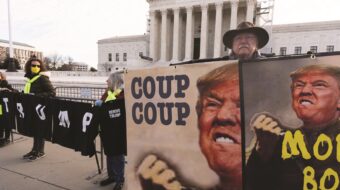
If you’re shy about being naked in front of others, you’d better avoid being arrested – for anything. According to an April 2 Supreme Court ruling, anyone arrested for any crime can be strip-searched.
Prior to 9/11, the prevalent attitude among law enforcement agencies was that strip-searches were inadmissible in relatively minor crimes. However, since then there has been a trend towards more searching.
Even an unpaid traffic ticket could get you naked in front of a cop. That was the actual case upon which the Supreme Court’s decision was made: A New Jersey man, Albert Florence, was arrested mistakenly for an unpaid fine sued police after he was strip-searched. The case made its way to the highest court, which issued the ruling in 5-4 decision.
Justice Anthony Kennedy, concurring with the majority, argued that courts should show deference towards correction officials “unless the record contains substantial evidence showing their policies are an unnecessary or unjustified response to problems of jail security.”
In his dissent, liberal Justice Stephen Breyer worried that people would be “subjected to serious invasions of their personal privacy.”
The decision did leave open the possibility that some strip-searches were unconstitutional, and laws in 10 states banning invasive searches are not affected by the ruling. Still, civil rights advocates are unhappy with the decision.
Albert Florence, his then-pregnant wife and four-year-old, were on their way to celebrate the purchase of a new home, Florence’s wife driving a vehicle he owned. They were pulled over by a New Jersey state trooper, and Florence’s license was run because he owned the vehicle. An unpaid fine for a parking ticket came up, though Florence had paid it, and even had a letter officially verifying the fact. Still, he was handcuffed, arrested, brought to jail for six days – and subjected to strip searches.
American Civil Liberties Union’s legal director, Steven R. Shapiro, said, “Today’s decision jeopardizes the privacy rights of millions of people who are arrested each year and brought to jail, often for minor offenses. Being forced to strip naked is a humiliating experience that no one should have to endure absent reasonable suspicion. Jail security is important, but it does not require routinely strip-searching everyone who is arrested for any reason, including traffic violations, and who may be in jail for only a few hours. “
The ACLU argues that as problematic as the strip searches are, they are emblematic of a more systemic problem of the U.S. justice system.
According to Shapiro, “The best way to preserve the privacy of the millions of Americans who are arrested each year for minor offenses is not to put them in jail in the first place. Instead, we should be using cheaper and more effective alternatives to incarceration.”
Photo: Supreme Court justices // iCivics












Comments